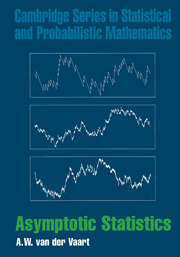Book contents
- Frontmatter
- Dedication
- Contents
- Preface
- Notation
- 1 Introduction
- 2 Stochastic Convergence
- 3 Delta Method
- 4 Moment Estimators
- 5 M–and Z-Estimators
- 6 Contiguity
- 7 Local Asymptotic Normality
- 8 Efficiency of Estimators
- 9 Limits of Experiments
- 10 Bayes Procedures
- 11 Projections
- 12 U -Statistics
- 13 Rank, Sign, and Permutation Statistics
- 14 Relative Efficiency of Tests
- 15 Efficiency of Tests
- 16 Likelihood Ratio Tests
- 17 Chi-Square Tests
- 18 Stochastic Convergence in Metric Spaces
- 19 Empirical Processes
- 20 Functional Delta Method
- 21 Quantiles and Order Statistics
- 22 L-Statistics
- 23 Bootstrap
- 24 Nonparametric Density Estimation
- 25 Semiparametric Models
- References
- Index
18 - Stochastic Convergence in Metric Spaces
Published online by Cambridge University Press: 05 June 2012
- Frontmatter
- Dedication
- Contents
- Preface
- Notation
- 1 Introduction
- 2 Stochastic Convergence
- 3 Delta Method
- 4 Moment Estimators
- 5 M–and Z-Estimators
- 6 Contiguity
- 7 Local Asymptotic Normality
- 8 Efficiency of Estimators
- 9 Limits of Experiments
- 10 Bayes Procedures
- 11 Projections
- 12 U -Statistics
- 13 Rank, Sign, and Permutation Statistics
- 14 Relative Efficiency of Tests
- 15 Efficiency of Tests
- 16 Likelihood Ratio Tests
- 17 Chi-Square Tests
- 18 Stochastic Convergence in Metric Spaces
- 19 Empirical Processes
- 20 Functional Delta Method
- 21 Quantiles and Order Statistics
- 22 L-Statistics
- 23 Bootstrap
- 24 Nonparametric Density Estimation
- 25 Semiparametric Models
- References
- Index
Summary
This chapter extends the concepts of convergence in distribution, in probability, and almost surely from Euclidean spaces to more abstract metric spaces. We are particularly interested in developing the theory for randomfunctions, or stochastic processes, viewed as elements of the metric space of all bounded functions.
Metric and Normed Spaces
In this section we recall some basic topological concepts and introduce a number of examples of metric spaces.
A metric space is a set equipped with a metric. metric or distance function is a map with the properties
A semimetric satisfies (i) and (ii), but not necessarily (iii). An open ball is a set of the form A subset of a metric space is open if and only if it is the union of open balls; it is closed if and only if its complement is open. A sequence converges to if and only if this is denoted by The closure If of a set consists of all points that are the limit of a sequence in; it is the smallest closed set containing. The interior A is the collection of all points such that for some open set G; it is the largest open set contained in. A function between two metric spaces is continuous at a point if and only if for every sequence it is continuous at everyif and only if the inverse image. A subset of a metric space is dense if and only if its closure is the whole space. A metric space is separable if and only if it has a countable dense subset. A subset of a metric space is compact if and only if it is closed and every sequence in has a converging subsequence.
- Type
- Chapter
- Information
- Asymptotic Statistics , pp. 255 - 264Publisher: Cambridge University PressPrint publication year: 1998



